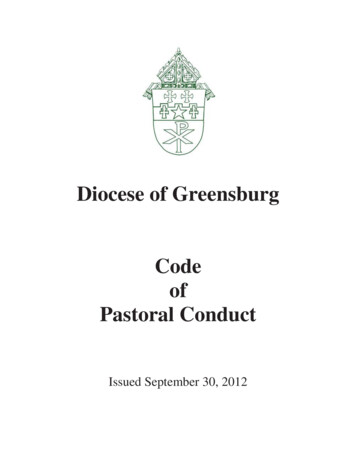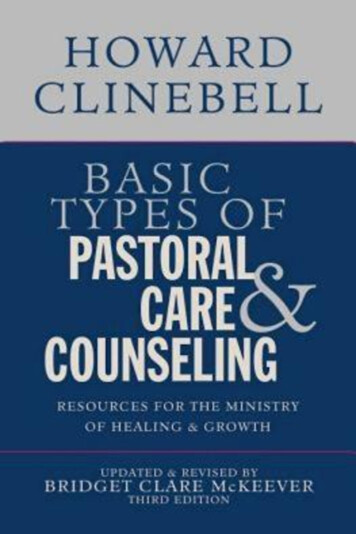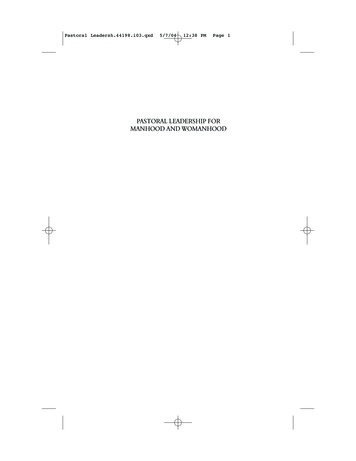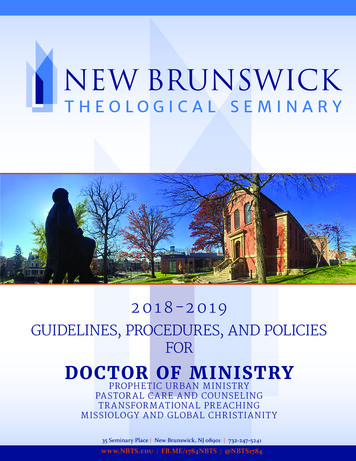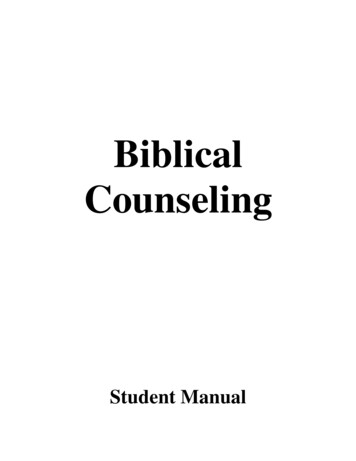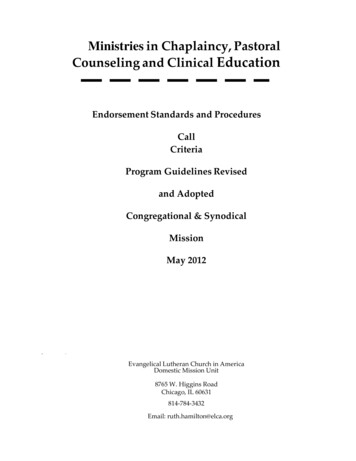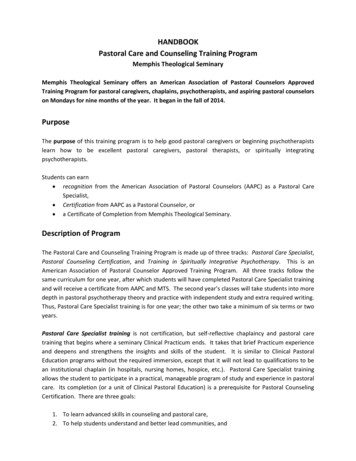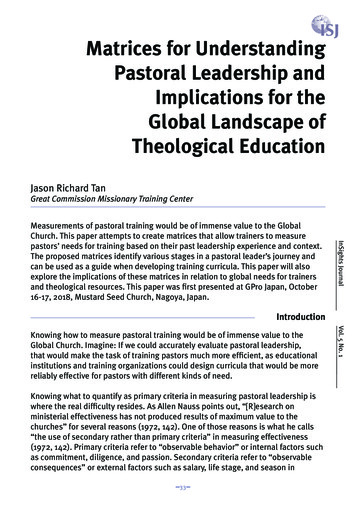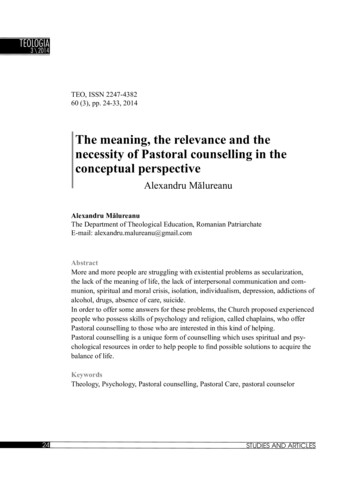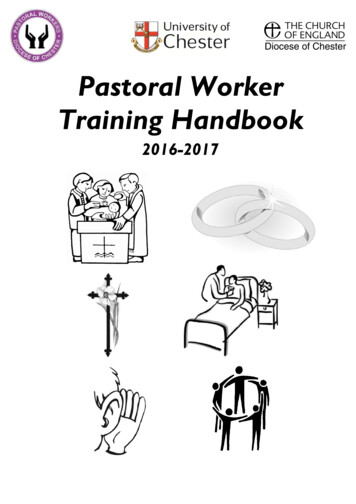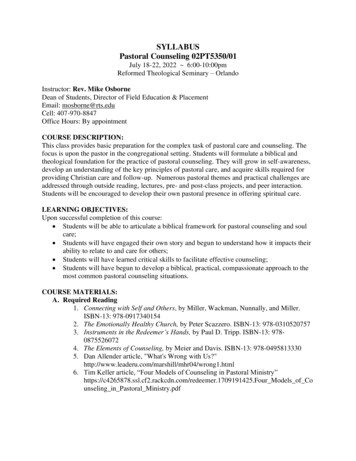
Transcription
SYLLABUSPastoral Counseling 02PT5350/01July 18-22, 2022 6:00-10:00pmReformed Theological Seminary – OrlandoInstructor: Rev. Mike OsborneDean of Students, Director of Field Education & PlacementEmail: mosborne@rts.eduCell: 407-970-8847Office Hours: By appointmentCOURSE DESCRIPTION:This class provides basic preparation for the complex task of pastoral care and counseling. Thefocus is upon the pastor in the congregational setting. Students will formulate a biblical andtheological foundation for the practice of pastoral counseling. They will grow in self-awareness,develop an understanding of the key principles of pastoral care, and acquire skills required forproviding Christian care and follow-up. Numerous pastoral themes and practical challenges areaddressed through outside reading, lectures, pre- and post-class projects, and peer interaction.Students will be encouraged to develop their own pastoral presence in offering spiritual care.LEARNING OBJECTIVES:Upon successful completion of this course: Students will be able to articulate a biblical framework for pastoral counseling and soulcare; Students will have engaged their own story and begun to understand how it impacts theirability to relate to and care for others; Students will have learned critical skills to facilitate effective counseling; Students will have begun to develop a biblical, practical, compassionate approach to themost common pastoral counseling situations.COURSE MATERIALS:A. Required Reading1. Connecting with Self and Others, by Miller, Wackman, Nunnally, and Miller.ISBN-13: 978-09173401542. The Emotionally Healthy Church, by Peter Scazzero. ISBN-13: 978-03105207573. Instruments in the Redeemer’s Hands, by Paul D. Tripp. ISBN-13: 97808755260724. The Elements of Counseling, by Meier and Davis. ISBN-13: 978-04958133305. Dan Allender article, "What's Wrong with tml6. Tim Keller article, “Four Models of Counseling in Pastoral deemer.1709191425.Four Models of Counseling in Pastoral Ministry.pdf
B. Recommended Reading (needed for Case Study Assignment, below)Facing Messy Stuff in the Church: Case Studies for Pastors and Congregations, byKenneth L. Swetland. ISBN-13: 978-0825436963COURSE REQUIREMENTS:A. Experiential Learning Project: Due Monday, July 18 by 6:00pmEach student is expected to choose ONE of the following options and either upload it toCanvas or bring their completed work to class on the first day:OPTION 1: Visit a place of human need and write a 3- to 5-page (typed, double-spaced)paper describing: (a) what you did, (b) what you asked, (c) whom you met, (d) how youfelt during the experience, (e) what you learned about yourself, and (f) how theexperience might inform your approach to pastoral counseling. The point of this exerciseis to be personally impacted by the experience and better understand the pain of asignificant segment of society. Students should submit their Experiential LearningProject proposal via email for the Instructor’s approval and feedback beforeproceeding. You might consider doing one of the following: Visit a nursing home or assisted living facility, interview a case worker, and visitwith residents. Tour a crisis pregnancy center, interview the staff, and (if possible) meet a client. Interview a hospital chaplain and shadow him or her for half a day. Interview someone who struggles with same-sex attraction. Sit in on an AA meeting and interview an alcoholic and his or her sponsor. Tour a mortuary and interview one of the morticians. Visit a homeless shelter or help at a soup kitchen, and interview a homelessperson. Visit an urban ministry center and talk with workers and residents.Students are encouraged to use creativity and initiative to come up with a project thatexposes them to the struggles of others. This is not an academic exercise. Papers mustreflect personal engagement and sincere effort to understand the challenges faced byother human beings. The Instructor is not as interested in knowing the history andactivities of the place you visit as he is in your personal experience, feelings, and insightsfor future ministry.OPTION 2: Create a Community Mental Health Resources Notebook for use by thepastoral care ministry in your current or future church. (NOTE: If you already haveaccess to such a notebook you may not choose this option!) Your notebook shouldinclude descriptions of and contact information for each resource, be well organized andeasily used as a quick reference guide to agencies, counselors, clinics, governmentservices, and ministries available in your area to meet a wide variety of mental, spiritual,physical, and emotional needs. Consider such things as pregnancy crisis centers, rape andsuicide hotlines, domestic violence shelters, food pantries, senior services, and so on.Notebooks will be evaluated on their thoroughness, organization, and effort shown.2
B. Emotionally Healthy Spirituality Report: Due Wednesday, July 20 by 6:00pmEach student is expected to complete the Emotionally Healthy Spirituality Assessmentfound on Canvas by the third day of class. Report your results using the scale on page 3in a one- to two-page (typed, double-spaced) paper in which you: (a) share insightsyou’ve gained about yourself through this inventory, and (b) describe at least one actionstep you will take during the rest of this calendar year to improve in the weakest area ofyour emotional health as indicated by this inventory. Include in your action plan the nameof an accountability partner and how you and this partner will plan to work together.C. Reading Report: Due Saturday, July 30 by 11:59pmEach student is expected to finish the Required Reading by the deadline indicated.Students will be graded based on a self-report according to the following rubric:Percentage of each book or article readRead by the deadline of July 30 (yes or no)A Reading Report form can be found by clicking on the Files tab in Canvas. It must befilled out and uploaded to Canvas by the deadline stated above.D. Reading Reflection Papers: Due Saturday, August 13 by 11:59pmEach student is expected to write a 1- to 2-page reflection paper (typed, double-spaced)about each of the four textbooks (not the two articles) on the Required Reading list. Yourpapers should contain brief answers to the following questions: (a) In one sentence, howwould you summarize each book? (b) What were (for you) the three most impactfulideas, statements, or principles in each book? These can be stated in bullet points. (c)What is one practical way you might implement each of those three impactful ideas inyour pastoral care ministry?E. Case Study Assignment: Due Saturday, August 27 by 11:59pmThe book, Facing Messy Stuff in the Church by Kenneth L. Swetland (Grand Rapids:Kregel, 2005), contains fourteen chapters, each one a case study of a conceivable pastoralcounseling situation. Students must choose ONE of those case studies and write a 3- to 5page (typed, double-spaced) paper containing thorough, thoughtful answers to thequestions listed at the end of the chapter. Your paper should also include a tentativepastoral care plan you might implement for the situation described.LATE ASSIGNMENTSAssignments will be expected by the due date. Exceptions should be addressed to the instructorin advance of the due date.ATTENDANCE AND PARTICIPATIONIt is expected that students will be present for all class sessions. Notify the Instructor if you findyou must miss part or all of a session. A portion of your grade is determined by punctuality andhow engaged you are in peer interaction.3
GRADESThere will be no exams or quizzes in this class. Final grades will be based on the degree to whichyour work shows personal application, effort, and serious engagement. The following chartshows how the final grade will be calculated:ITEMReading ReportReading Reflection PapersEmotional/Spiritual Health Inventory ReportCase Study ProjectExperiential Learning ProjectClass Attendance & ParticipationPERCENTAGE15%20%15%20%20%10%TOTAL 100%The grading scale employed at Reformed Theological Seminary is as follows:AAB BBC CCD -710.66below 70 0.00incompletewithdrawsatisfactorypassingThe grade “I” indicates that the work required for the course was not completed. It is given onlywhen special, extenuating circumstances (such as illness) prevent the student from completingthe work or taking the examination. A written request for an extension must be submitted prior tothe due date of the work concerned. If the request is granted, it remains the responsibility of thestudent to complete all work for the course as soon as possible. In any case, an “I” grade must beremoved within the extension time granted; otherwise it will be changed to “F.” The grade “W”indicates that a student has withdrawn from a course after the drop deadline. This grade isgranted by the academic dean only in extenuating circumstances. The grade “P” is only used as aPass/Fail option and is limited to the Field Education course.4
Course Objectives Related to MDiv* Student Learning OutcomesCourse: Pastoral Counseling 02PT5350Professor: Mike OsborneCampus: OrlandoMDiv* Student Learning OutcomesRubricIn order to measure the success of the MDiv curriculum, RTS has definedthe following as the intended outcomes of the student learning process.Each course contributes to these overall outcomes. This rubric shows thecontribution of this course to the MDiv outcomes. Date: one*As the MDiv is the core degree at RTS, the MDiv rubric will be used in this syllabus.Articulation(oral oadly understands and articulates knowledge,both oral and written, of essential biblical,theological, historical, and cultural/globalinformation, including details, concepts, andframeworks.Significant knowledge of the original meaning ofScripture. Also, the concepts for and skill to researchfurther into the original meaning of Scripture and toapply Scripture to a variety of modern circumstances.(Includes appropriate use of original languages andhermeneutics; and integrates theological, historical,and cultural/global perspectives.)Significant knowledge of Reformed theology andpractice, with emphasis on the WestminsterStandards.Demonstrates a love for the Triune God that aids thestudent’s sanctification.Desire forWorldviewBurning desire to conform all of life to the Word ofGod.WinsomelyReformedEmbraces a winsomely Reformed ethos. (Includes anappropriate ecumenical spirit with other Christians,especially Evangelicals; a concern to present theGospel in a God-honoring manner to non-Christians;and a truth-in-love attitude in disagreements.)Ability to preach and teach the meaning of Scriptureto both heart and mind with clarity and enthusiasm.PreachWorshipShepherdKnowledgeable of historic and modern Christianworship forms; and ability to construct and skill tolead a worship service.Ability to shepherd the local congregation: aiding inspiritual maturity; promoting use of gifts and Students must articulate aframework for counselingderived from Scripture andsound theology.Pastoral counseling must begrounded in what the Biblereveals about the nature of Godand man, our fallen condition,and the path to redemption andhealing.Reformed theology is woventhroughout counseling. TheWCF addresses counselingissues and concerns.Students must deal with theirown issues in order to counselothers.Counseling must be done inways consistent with a biblicalworldview.Counseling is connected withevangelism. Studentscompassionately bring thegospel to bear on humanproblems in Christ’s name.NoneModerateStrongWorship is ultimately the goal ofChristian counseling.This course prepares pastorsand counselors to shepherd theflock well.
Church/Worldand encouraging a concern for non-Christians, bothin America and worldwide.Ability to interact within a denominational context,within the broader worldwide church, and withsignificant public issues.6MinimalA vibrant counseling ministryoverflows to other churches andthe community.
Pastoral Counseling 02PT5350/01 July 18-22, 2022 6:00-10:00pm Reformed Theological Seminary - Orlando . pastoral care ministry in your current or future church. (NOTE: If you already have access to such a notebook you may not choose this option!) Your notebook should
